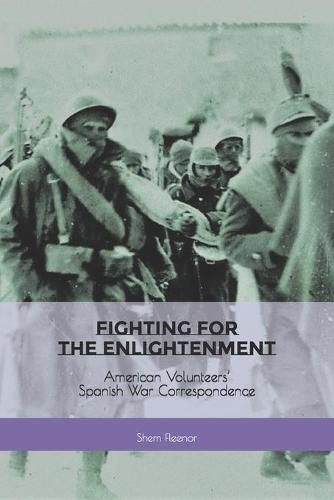Readings Newsletter
Become a Readings Member to make your shopping experience even easier.
Sign in or sign up for free!
You’re not far away from qualifying for FREE standard shipping within Australia
You’ve qualified for FREE standard shipping within Australia
The cart is loading…






1848 Publishing presents Shem Fleenor’s second book-length research study. Fleenor examines correspondence written in the midst of combat, paying special attention to letters written by American volunteers during what is often erroneously referred to as the Spanish Civil War. The war between Fascist Nationalists and Republicans in 1930s Spain was global in scope. It is considered by many scholars to be the first chapter of World War II because Adolf Hitler’s German Wehrmacht and Benito Mussolini’s Italian Army were so heavily invested in aiding Francisco Franco’s forces to defeat the Spanish Republic. The western empires - the United States, France, and England – remained neutral throughout the duration of the war. But neutrality was as much a misnomer as civil war because the western democracies’ laissez faire policy permitted the Fascists, who had superior firepower, to topple the Republic. Spain’s democratically elected Popular Front government was, however, aided by a multinational contingent known as the International Brigades, which was comprised of nearly seventeen-thousand volunteers from more than fifty nations - including nearly three-thousand Americans. The International Brigades were organized by the Communist Party. But the volunteers were not paid and only minimally equipped by the Soviet Union, which was, when considering their war within a war against anarchists, a counter-revolutionary force in Spain. The American volunteers lucky enough to survive the war were demonized as pre-mature anti-fascist communists and suspected of disloyalty during World War II and throughout the Cold War. Although many American volunteers had, in fact, joined the Communist Party during the Great Depression, many others did not. And so, the epithet that American volunteers for the Spanish Republic were disloyal and/or went to Spain to further Bolshevism’s greed is reductionist Culture War rhetoric designed to diminish their idealism in contrast to politicians’ willingness to stand idly by as fascists toppled democracies throughout Europe and, ultimately, pulled the United States, France, and England into World War II. The American volunteers’ correspondence during the Spanish War underscores that many of them did not risk life, limb, and citizenship fighting for communism; they fought for liberty, equality and fraternity - the same Enlightenment Era ideals that inspired and guided the American, French, Haitian, and Russian Revolutiuons.
$9.00 standard shipping within Australia
FREE standard shipping within Australia for orders over $100.00
Express & International shipping calculated at checkout
1848 Publishing presents Shem Fleenor’s second book-length research study. Fleenor examines correspondence written in the midst of combat, paying special attention to letters written by American volunteers during what is often erroneously referred to as the Spanish Civil War. The war between Fascist Nationalists and Republicans in 1930s Spain was global in scope. It is considered by many scholars to be the first chapter of World War II because Adolf Hitler’s German Wehrmacht and Benito Mussolini’s Italian Army were so heavily invested in aiding Francisco Franco’s forces to defeat the Spanish Republic. The western empires - the United States, France, and England – remained neutral throughout the duration of the war. But neutrality was as much a misnomer as civil war because the western democracies’ laissez faire policy permitted the Fascists, who had superior firepower, to topple the Republic. Spain’s democratically elected Popular Front government was, however, aided by a multinational contingent known as the International Brigades, which was comprised of nearly seventeen-thousand volunteers from more than fifty nations - including nearly three-thousand Americans. The International Brigades were organized by the Communist Party. But the volunteers were not paid and only minimally equipped by the Soviet Union, which was, when considering their war within a war against anarchists, a counter-revolutionary force in Spain. The American volunteers lucky enough to survive the war were demonized as pre-mature anti-fascist communists and suspected of disloyalty during World War II and throughout the Cold War. Although many American volunteers had, in fact, joined the Communist Party during the Great Depression, many others did not. And so, the epithet that American volunteers for the Spanish Republic were disloyal and/or went to Spain to further Bolshevism’s greed is reductionist Culture War rhetoric designed to diminish their idealism in contrast to politicians’ willingness to stand idly by as fascists toppled democracies throughout Europe and, ultimately, pulled the United States, France, and England into World War II. The American volunteers’ correspondence during the Spanish War underscores that many of them did not risk life, limb, and citizenship fighting for communism; they fought for liberty, equality and fraternity - the same Enlightenment Era ideals that inspired and guided the American, French, Haitian, and Russian Revolutiuons.